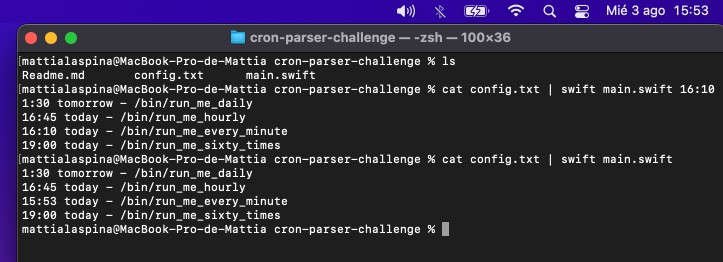Sarpe
/sɑːrp/
Haskell-like parser combinators in a Schwifty manner
Toy project If you are looking for something more production-ready, I would reccomend: davedufresne/SwiftParsec
Most the theory is from Scott Wlaschin’s work on parser combinators with F#. I really reccomend his talk “Understanding parser combinators: a deep dive”. It was my first intro to combinators and what peaked my interest.
What are parser combinators
Parsers combinators are parsers that be semantically combined with other parsers. Such as:
- Presedence:
parser1.preceded(by: parser2) - Repitition:
parser1.repeat(4...) - Branching:
either(parser1, parser2)
Parser combinators are also monads, which mean we can bind them to a function that returns a parser, and apply it to the result.
- Map:
parseDigits.map { Int($0) } - Optional:
parser.optional() - Application:
parser1.apply(parser2)
The most important parser is satisfy, which takes one element and returns .success if it matches the predicate function.
Example: satsify {"a"..."z" ~= $0} (takes a character if it’s a lowercase letter)
The whole parser library can be built from bind and satisfy, but with supporting backtrack prevention, limits and for optimalization reasons, there are a few custom functions.
Combinators are very modular, so one can implement the parts and combine it to a bigger parser.
Features
- Swifty: Focus on creating parsers with Swift’s expressiveness rather having a big API surface
- No operator overloading: a lot of monadic parser libraries use
<&>, ‘>>=,<|>` etc. to combine parsers. I prefer words. - Few primitives: Makes it easy to optimize
- Generic: Not limited to strings
- Value oriented: Parsers are values, and they are immutable.
- Backtrack prevention:
- Buffer limit aware:
Examples
Cat or dog
enum Animal {
case cat
case dog
}
let parser = either(
literal("cat").to(Animal.cat),
literal("dog").to(Animal.dog)
)
assert(parser.parse("cat") == .success(.cat, ""))
Bind example
enum Number: Equatable {
case signed(Int)
case unsigned(UInt)
}
let number = char("-").optional().bind { minus in
let unsignedNumber = satisfy { "0" ... "9" ~= $0 }
.repeat(0...)
.map { String($0) }
if let minus {
return unsignedNumber
.map { -Int($0)! }
.map { Number.signed($0) }
} else {
return unsignedNumber
.map { UInt($0)! }
.map { Number.unsigned($0) }
}
}
assert(number.parse("3") == .limit(.unsigned(3), ""))
assert(number.parse("-0345somethingElse") == .success(.signed(-345), "somethingElse"))
JSON array
Where jsonWhitspace and jsonValue are already declared.
let jsonArray = either(
jsonWhitespace
.preceded(by: char("["))
.terminated(by: char("]"))
.to(JSON.array([])),
serial(
jsonValue(),
jsonValue()
.preceded(by: char(","))
.repeat(0...)
).map { first, rest in
[first] + rest
}
.preceded(by: char("["))
.terminated(by: char("]"))
.map { JSON.array($0) }
)


